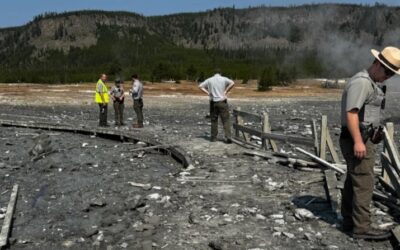State to Assist in Local Public Health Effort
The Teton County Department of Health is finalizing work to help improve issues with health equity in Jackson Hole. Though the area tends to rank highly in the overall wellbeing of its citizens, many of the community’s poorest members are often left behind in terms of the services they receive—or sometimes even know about. That’s why the county health department is applying for a grant to help with outreach efforts, according to Director Jodie Pond, who spoke Monday at a Board of County Commissioners meeting.
“What we will be working with the state on is making sure people are connected to care, whether that be medical care or social services,” Pond said.
Pond added that the effort will help fund two positions: a coordinator to work with local nonprofits and a Spanish-speaking outreach worker. The State of Wyoming will likely be assisting with these funds and other similar future efforts, as Gov. Mark Gordon has identified healthcare access as an issue he’d like to see federal American Rescue Plan funds go towards.
Effort to Delist Grizzlies Moves Forward
The Wyoming Game and Fish Commission approved a new tri-state memorandum of agreement (MOA) for grizzly bear management Tuesday. Developed in partnership with officials in Idaho and Montana, the MOA is part of the states’ effort to remove grizzlies in the Greater Yellowstone Ecosystem from the federal Endangered Species List. Dan Thompson supervises the large carnivore section of Wyoming Game and Fish. He said there’s a lot of misinterpretation of what such a delisting would mean.
“It would not strip protections of grizzly bears. It would not change the fact that we have to demonstrate that [the] population has recovered into perpetuity,” Thompson said. “What it would do is it would allow us to have management authority over the population, and quite honestly, not have to call the [U.S.] Fish and Wildlife Service to get permission to conduct management activities within our jurisdiction.”
The revised MOA aims to address past court concerns about delisting grizzlies. It still needs to be approved by the Idaho and Montana commissions, and then Wyoming plans to submit an official delisting petition to the U.S. Fish and Wildlife Service.
Health Care Worker Vaccine Mandate Hits Roadblock
A federal judge temporarily blocked the Biden administration’s vaccine mandate for health care workers in Wyoming and nine other states Monday. The ruling comes after the Cowboy State and others—including Alaska, Nebraska and New Hampshire—sued to stop the requirement that workers at health care facilities that get Medicare and Medicaid funding have to get a COVID-19 vaccine. The judge appeared to agree with the state’s argument that the federal rule would lead to staffing shortages.
A second federal judge then expanded the preliminary injunction nationwide in a separate ruling on Tuesday.
Gov. Mark Gordon welcomed the Monday’s initial ruling, saying, “healthcare employees should not be forced to choose between vaccination and termination.” Wyoming also has two other pending lawsuits challenging vaccine mandates for federal workers and contractors and private businesses with more than 100 employees.
“Squaw” to be Removed from Federal Place Names
The word “squaw” has been declared a derogatory term by the U.S. Department of the Interior, and therefore will be removed from all federal place names. A total of 43 locations in Wyoming, including Squaw Creek in Bridger-Teton National Forest, will get new titles, according to the Casper-Star Tribune. Interior Secretary Deb Haaland, who is the first Native American to lead her agency, said in a late November speech that the decision is part of her effort to eliminate offensive terms from the government’s vocabulary.
“Our nation’s public lands and waters should be places to celebrate the outdoors and our shared cultural heritage, not to perpetuate the legacies of oppression,” Haaland said. “Indigenous people, and in particular women, know how offensive this word is, and I am proud to be in a position to rid federal places of it.”
The term “squaw” has historically been used as an ethnic slur to describe Indigenous women. The federal government will ultimately decide on what to rename locations currently containing the term, but local and state boards can send in recommendations to the Department of the Interior.
Jackson Hole Celebrates Hanukkah
The Jewish holiday of Hanukkah began Sunday and will continue through sundown on Monday, Dec. 6. Chabad Rabbi Zalman Mendelsohn leads the Chabad Jewish Center of Wyoming in Jackson, and he faced a busy week of celebration.
“There’s a new rabbi, thank God, that will be moving to Cheyenne here within the next couple of months,” he said. “But at this time, I am currently the only rabbi in the State of Wyoming.”
Mendelsohn said everyone is welcome to join in for a local menorah lighting at the Town Square on Saturday at 7 p.m. KHOL also asked the rabbi about the significance of religious traditions in 2021, when partisan and cultural divides seem stronger than ever.
“I think that in a time like this, what we’re experiencing is people are tired of the bickering of politics and the way that it seeks to divide and conquer. The way that it seeks to separate human beings,” Mendelsohn said. “We are booming. The Chabad Jewish Center of Wyoming is growing now more than ever before.”
More information about celebrating the eight-day Festival of Lights in Jackson is available at jewishwyoming.com or jhjewishcommunity.org.
County to Update Septic Regulations
Teton County officials are proposing changes to regulations for small wastewater facilities, including septic tanks at single-family homes. The goal is to improve local water and soil quality through updated environmental standards and more robust education programs. For example, Teton County Engineer Amy Ramage said at a meeting Tuesday that a new manual explaining how a septic system should be pumped and maintained will now be handed out to everyone building a new one.
“This is intended to be a strong guidance document — kind of more of a user-friendly way of giving them guidance that ‘Yes, you have a septic system. And yes, it needs to be maintained,’” Ramage said. “Just because you flush the toilet and it goes away doesn’t mean you can’t maintain things.”
The county also said regulations are being updated in order to better comply with state environmental standards. But some local activists say the changes won’t necessarily ease the well-documented water quality issues in Jackson Hole’s rivers and streams. Several residents argued Tuesday that those problems stem from existing, poorly-maintained systems, which the new rules won’t fix. Ramage said she and other county officials plan to start working on a more comprehensive water quality planning effort early next year to try and address those concerns.
A New Way to Get Around
START Bus launched its East Jackson Microtransit service Saturday, replacing its Circulator routes. Rather than short buses, this service will use a fleet of vans and other smaller vehicles, and passengers can call for rides using an app on their phone. START Director Darren Brugman said in a mid-September meeting that microtransit has been a goal in the Town of Jackson for a long time and should be useful for locals.
“Microtransit is an on-demand service that will focus on utilizing smaller vehicles in the town and East Jackson area, thus allowing other fixed-route services to operate more efficiently while also serving to disperse residential areas of East Jackson with smaller battery electric vehicles,” Brugman said.
About 10-15 drivers are now employed as microtransit drivers making $20 an hour, and most of the fleet’s vehicles are electric and include ski racks. The town shuttle and START’s regular routes are still operational, but new microtransit riders can download the app and start calling for rides now.





